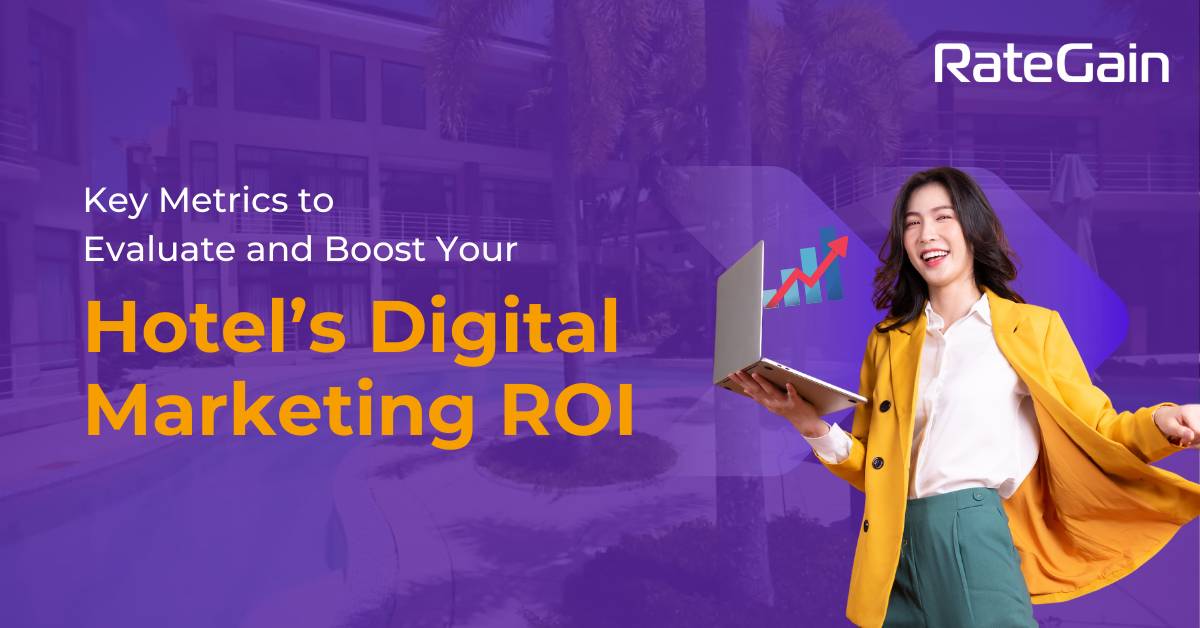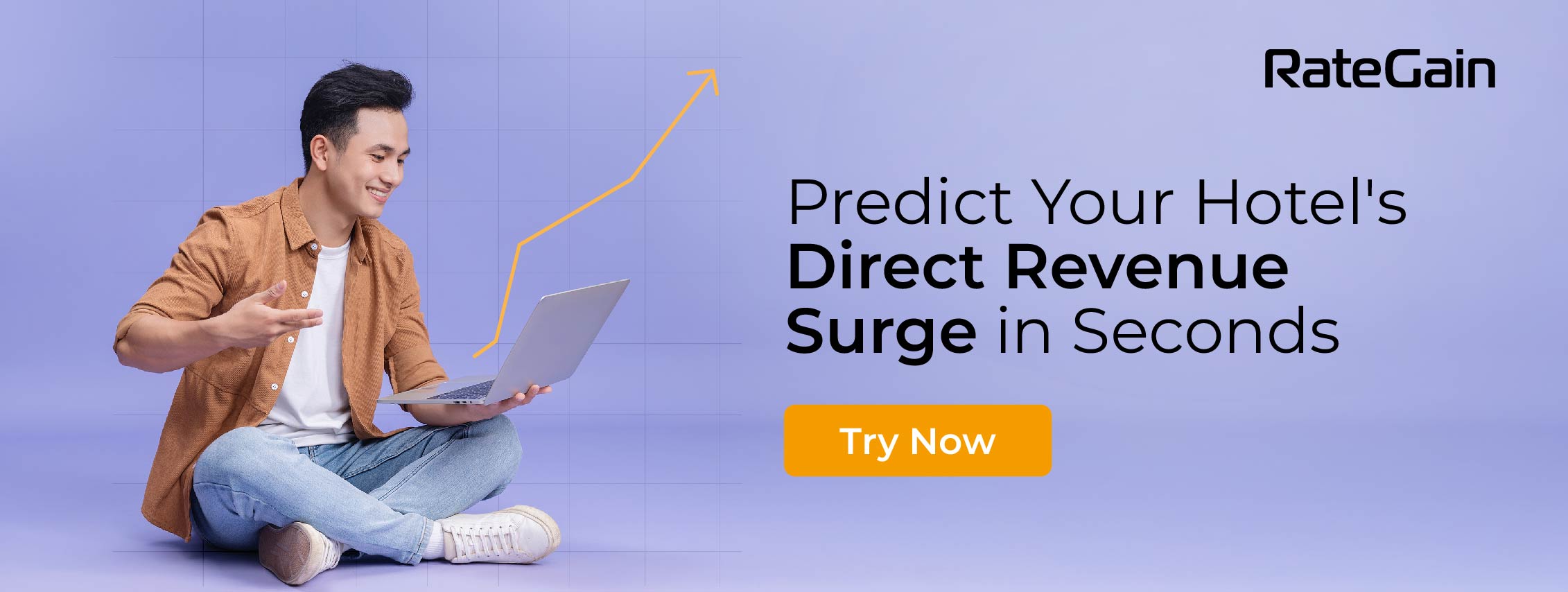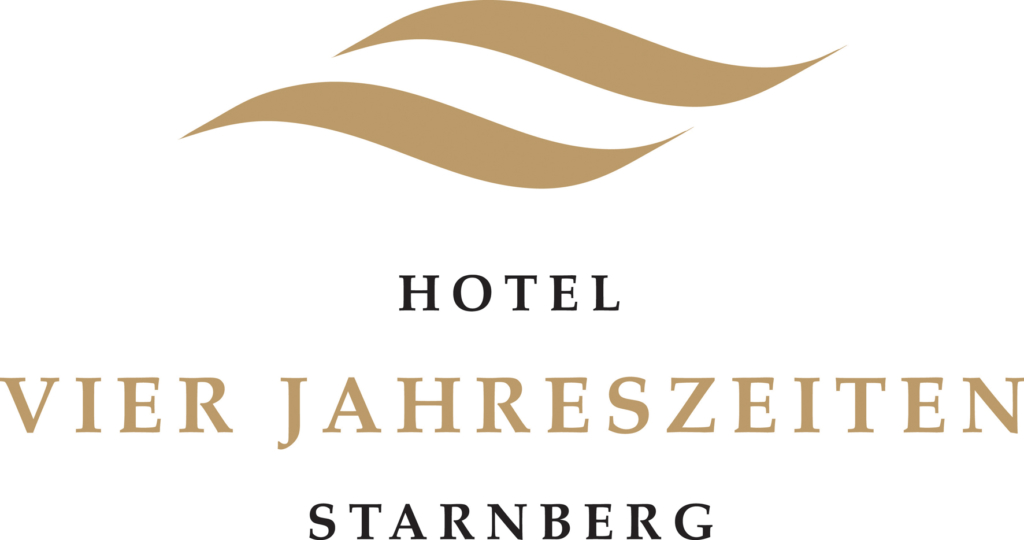Right Metrics to Evaluate Your Hotel’s Digital Marketing ROI
Hotel marketing has evolved into a sophisticated blend of strategies designed to enhance visibility, drive bookings, and maximize revenue, especially in today’s environment. However, with so many strategies, channels, and tactics at your disposal, how can you determine if your digital marketing efforts are truly paying off? That’s where Return on Investment (ROI) becomes crucial.
This blog serves as a comprehensive guide for hospitality leaders like you to evaluate and improve your hotel’s digital marketing ROI. We’ll delve into the essential metrics that can elevate your marketing efforts, boost Return on Ad Spend (ROAS), and optimize key performance indicators like RevPAR (Revenue Per Available Room) and RGI (Revenue Generation Index).
Why Digital Marketing ROI matters?
Understanding digital marketing ROI is critical for revenue managers because it directly impacts your hotel’s profitability and strategic decision-making. Here are a few reasons why measuring ROI is essential:
- Resource Allocation: By knowing which campaigns deliver the highest returns, you can allocate your marketing budget more effectively, focusing on strategies that yield the best results.
- Performance Evaluation: ROI measurement allows you to assess the effectiveness of various marketing channels and tactics, enabling you to refine your approach for better outcomes.
- Goal Alignment: It ensures that your marketing efforts align with your hotel’s overall revenue goals, helping you achieve targets like increasing direct bookings and improving guest retention.
- Competitive Edge: Understanding your ROI helps you stay ahead of competitors by identifying and capitalizing on the most effective marketing strategies.
Challenges in measuring ROI
Despite its importance, measuring digital marketing ROI presents several challenges for revenue managers in the hospitality industry:
- Attribution Complexity: With multiple touchpoints along the customer journey, attributing conversions to specific marketing activities can be difficult. Guests may interact with various channels before making a booking, complicating the attribution process.
- Data Integration: Combining data from different sources, such as social media, search engines, and booking platforms, into a cohesive analysis can be complex and time-consuming.
- Dynamic Pricing: The dynamic nature of hotel pricing and inventory management adds another layer of complexity to measuring ROI. Fluctuations in room rates and availability can impact the accuracy of ROI calculations.
- Long Sales Cycles: In the hospitality industry, the time between initial engagement and booking can be lengthy, making it harder to track the immediate impact of marketing efforts.
- External Factors: External factors such as seasonality, economic conditions, and travel trends can influence booking behaviors, complicating the assessment of marketing performance.
Key Metrics in Hotel Digital Marketing
-
Website Traffic Metrics
For hotel revenue managers, optimizing your website is crucial to maximizing revenue. Tracking key metrics such as the number of unique visitors and sessions on your website, bounce rate, and average session duration ensures that you are not only attracting potential guests but also converting them into actual bookings. This process involves improving the user interface, enhancing content quality, and streamlining the booking process. By continuously monitoring and adjusting your strategies based on these metrics, you can create a more effective online presence that drives higher revenue for your hotel.
-
Conversion Rate
The conversion rate measures the percentage of website visitors who complete a desired action, such as booking a room. A higher conversion rate indicates the effectiveness of your hotel’s website and booking process. To enhance conversion rates, ensure your website is user-friendly, mobile-optimized, and offers a seamless booking experience.
-
Cost Per Acquisition (CPA)
CPA tracks the cost incurred to acquire a new customer through your marketing efforts. Lowering CPA while maintaining or increasing the number of bookings indicates a more efficient marketing strategy. Techniques to reduce CPA include optimizing ad targeting, improving ad creatives, and leveraging retargeting campaigns.
-
Click-Through Rate (CTR)
CTR measures the effectiveness of your digital ads by tracking the percentage of viewers who click on your ads. A high CTR suggests that your ad copy and visuals are engaging and relevant to your target audience. Improve CTR by refining your ad headlines, using compelling visuals, and testing different ad formats.
-
Social Media Engagement
Engagement on social media platforms is a vital metric for hotel social media marketing. It includes likes, shares, comments, and overall interaction with your content. High engagement rates indicate that your social media strategy resonates with your audience. Boost engagement by sharing high-quality content, running interactive campaigns, and responding promptly to comments and messages.
Understanding the Core Metrics for Revenue Team
-
ADR vs Transient ADR
ADR (Average Daily Rate) and Transient ADR are essential metrics for understanding revenue per room.
ADR: ADR measures the average revenue earned per occupied room in a given period. This metric provides a broad overview of your pricing strategy’s effectiveness across all booking segments, including groups, corporate bookings, and transient (individual) travelers. It is calculated by dividing the total room revenue by the number of rooms sold.
ADR= Total Room Revenue/Number of Rooms Sold
Transient ADR: Transient ADR specifically measures the average revenue earned per occupied room from individual travelers, excluding group and corporate bookings. This metric is crucial for understanding the profitability of your transient segment, which typically consists of leisure and business travelers booking individually rather than as part of a group.
Transient ADR= Transient Room Revenue/Number of Transient Rooms Sold
Specifically measures the average rate for rooms sold to individual guests, excluding group bookings.
Analyzing both helps revenue managers like you to better understand different revenue streams and optimize pricing strategies for various market segments. By differentiating between ADR and Transient ADR, you can develop more nuanced strategies to maximize revenue from each market segment, leading to improved financial performance and a better understanding of guest behaviors.
-
Return on Ad Spend (ROAS)
ROAS is a fundamental metric that measures the revenue generated for every dollar spent on advertising. For hotel marketing, a high ROAS indicates that your campaigns are effectively driving bookings and generating revenue. To calculate ROAS, use the formula:
ROAS = Revenue from Ads/Ad Spend
Aiming for a high ROAS ensures that your hotel marketing strategy is cost-effective and yields significant returns. To improve ROAS, focus on targeted advertising, personalized marketing messages, and optimizing your ad placements.
To improve ROAS, consider the following strategies:
- Targeted Advertising: Use data-driven insights to target your audience more precisely. Utilize digital identities and travel intent data to reach high-intent travelers.
- A/B Testing: Experiment with different ad creatives, copy, and placements to see what resonates best with your audience.
- Retargeting: Focus on past visitors who showed interest but did not convert. Retargeting can significantly boost your conversion rates.
-
Revenue Per Available Room (RevPAR)
RevPAR is a critical metric in the hotel industry, reflecting the average revenue generated per available room. It combines both occupancy rates and average daily rate (ADR) to provide a comprehensive view of your hotel’s financial performance. Calculate RevPAR using:
RevPAR = Total Room Revenue/Total Available Rooms
or
RevPAR=Occupancy Rate×ADR
To enhance RevPAR, consider these hotel marketing solutions:
- Dynamic Pricing: Implement dynamic pricing strategies to adjust room rates based on demand and market conditions.
- Promotions and Packages: Offer special promotions and packages to attract different segments of travelers.
- Direct Bookings: Encourage direct bookings through your website to avoid hefty commissions from OTAs (Online Travel Agencies).
-
Revenue Generation Index (RGI)
RGI measures your hotel’s performance relative to its competitive set. An RGI greater than 1 indicates that your hotel is capturing more than its fair share of the market. Calculate RGI as follows:
RGI = Hotel RevPAR/Competitive Set RevPAR
To boost RGI, focus on differentiating your hotel through unique marketing initiatives, superior customer service, and leveraging digital marketing solutions. To improve RGI, focus on:
- Market Analysis: Regularly analyze market trends and competitor performance to stay ahead.
- Brand Differentiation: Highlight what makes your hotel unique through compelling content marketing and hotel social media marketing.
- Customer Experience: Enhance the guest experience to drive positive reviews and repeat business.
Read more: What is RevPAR ? Why does it Matter?
Tools and Platforms used for measuring Digital Marketing ROI
To effectively measure your hotel’s digital marketing ROI, it is essential to use the right tools and platforms that provide comprehensive insights and analytics.
-
Google Analytics
A powerful tool for tracking website traffic, user behavior, and conversion rates. Google Analytics offers detailed reports that help you understand how visitors interact with your site and which channels drive the most bookings.
-
Hotel CRM Systems
Customer Relationship Management (CRM) systems help you manage guest data, track marketing campaigns, and analyze customer interactions. These systems provide valuable insights into guest preferences and booking behavior.
-
Ad Platforms
Monitor the performance of your advertising campaigns directly on platforms like Google Ads, Facebook Ads Manager, and other social media ad platforms. These tools offer real-time data on ad spend, impressions, clicks, and conversions.
-
Revenue Management Systems (RMS)
Integrate your marketing data with RMS to align your pricing strategies with demand forecasts. RMS helps optimize room rates and availability based on market conditions and booking trends.
-
Marketing Automation Tools
Use marketing automation platforms to streamline your marketing efforts, track campaign performance, and measure ROI. Tools like HubSpot, Marketo, and Mailchimp provide comprehensive analytics and reporting features.
Strategies to Improve Digital Marketing ROI
-
Hotel Website Optimization
Enhance your hotel’s website by improving user experience, loading speed, and mobile responsiveness. Use SEO best practices to increase organic traffic and ensure a seamless booking process. A well-optimized website attracts more visitors, reduces bounce rates, and boosts conversion rates, ultimately increasing your digital marketing ROI.
-
Email Marketing for Hotels
Email marketing remains a powerful tool for driving bookings and enhancing guest relationships. Personalized email campaigns can significantly improve engagement and conversion rates. Use segmentation to target specific guest segments with tailored offers and information. Regularly analyze open rates, click-through rates, and conversion rates to refine your email marketing strategy.
-
Content Marketing for Hotels
Content marketing plays a pivotal role in attracting and retaining guests. High-quality, relevant content can drive organic traffic to your website and establish your hotel as a thought leader in the hospitality industry. Focus on creating blog posts, guides, and videos that address common travel concerns, highlight local attractions, and showcase your hotel’s unique offerings. Track metrics such as website traffic, time on page, and social shares to gauge the effectiveness of your content marketing efforts.
-
Hotel Social Media Marketing
Leveraging social media platforms is essential for reaching a broader audience and engaging with potential guests. Develop a social media strategy that includes regular posting, engaging with followers, and running targeted ad campaigns. Monitor metrics like reach, engagement, and follower growth to assess your social media performance and adjust your strategy accordingly.
-
Paid Marketing in the Hospitality Industry
The hospitality industry is rapidly embracing digital marketing solutions to stay competitive. Utilize tools such as search engine optimization (SEO), pay-per-click (PPC) advertising, and metasearch marketing to enhance your hotel’s online presence. Regularly track metrics like organic search rankings, paid search performance, and metasearch conversion rates to optimize your digital marketing campaigns.
-
Online Reputation Management (ORM)
Monitor and manage your hotel’s online reviews and ratings. Respond promptly and professionally to guest feedback to build a positive reputation. Effective ORM can enhance your brand image, attract more bookings, and increase guest loyalty by demonstrating your commitment to quality service and guest satisfaction.
Maximizing ROI Through Data-Driven Insights
To truly maximize your hotel’s digital marketing ROI, it’s crucial to adopt a data-driven approach. This involves continuously monitoring key metrics, analyzing performance data, and making informed decisions based on insights. Implementing advanced analytics tools can provide deeper insights into guest behavior, campaign performance, and market trends.
-
Advanced Analytics and Reporting
Use advanced analytics platforms to gather comprehensive data on your marketing efforts. These tools can track metrics across multiple channels, providing a holistic view of your performance. Regular reporting and analysis help identify areas for improvement and opportunities for optimization.
-
Personalization and Automation
Incorporate personalization and automation into your hotel marketing strategy to enhance guest experiences and improve efficiency. Personalized marketing messages based on guest preferences and behaviors can significantly boost engagement and conversions. Automation tools can streamline repetitive tasks, allowing your team to focus on strategic initiatives.
-
Continuous Optimization
Digital marketing is an ongoing process that requires continuous optimization. Regularly review your marketing campaigns, test different strategies, and adjust based on performance data. This iterative approach ensures that your marketing efforts remain effective and aligned with your business goals.
How RateGain’s Digital Marketing Services Can Help in Improving Your Hotel’s Direct ROI
RateGain’s digital marketing solution is designed to enhance your hotel’s digital marketing efforts and boost direct ROI. By leveraging advanced features and extensive data, RateGain helps you achieve precise targeting, effective campaign management, and significant cost savings. Here’s how:
-
Reach In-market Audience with Travel Intent Data
Gain access to the largest database of over 2.1 billion digital identities from 300+ global brands. This wealth of data allows you to identify and target high-intent travelers, ensuring your marketing campaigns reach the most relevant audience.
-
Omni-channel Management
Engage your guests throughout their entire journey with seamless omni-channel management. RateGain’s digital marketing solution enables you to connect with your audience across multiple platforms, including meta search, social media, display ads, and email marketing, ensuring consistent and effective communication.
-
Risk-Free Commission Model
Continue to capitalize on our pay-per-stay commission model, even after Google’s discontinuation of CPA bidding. Bid on meta search, social media, display ads, and more without any upfront costs. Only pay for completed stays, which means you don’t need to pay for no shows or cancellations, aligning your marketing spend directly with revenue generated.
-
Server-Side Tracking
Easily reconcile bookings and corresponding fees with server-side tracking of reservation IDs. This feature ensures accurate tracking and reporting, providing you with clear insights into your campaign performance and ROI.
-
Automated Bidding
Maximize your ad performance with automated bidding during high-demand seasons. RateGain’s AI-powered algorithms adjust bids in real-time, ensuring your campaigns are always optimized for the best possible results.
-
Comprehensive Reporting & Analytics
Keep a close track on your spending, ad placements, and results with detailed reporting and analytics. RateGain offers pixel tracking for accurate conversion analysis from direct campaigns. This allows you to closely monitor and track bookings and understand guest behavior to optimize and personalize marketing strategies for more bookings.
-
Parity Monitoring
Ensure your rates are in parity and forecast demand effectively. RateGain monitors your rates across various channels, helping you maintain competitive pricing and maximize revenue.
-
Save Distribution Costs
Save up to 5-10% in distribution costs by driving direct bookings. By encouraging direct bookings through your website, RateGain helps you reduce reliance on OTAs and other third-party channels, increasing your profitability.
-
Widest Network of Connected Booking Engines
Go live immediately with 100+ connected booking engines. RateGain’s extensive network allows you to integrate seamlessly with various booking platforms, expanding your reach and driving more direct bookings.
RateGain’s digital marketing solution empowers your marketing team to take control of the digital marketing funnel, improve direct ROI, and drive sustainable growth for your hotel.
Conclusion
Evaluating your hotel’s digital marketing ROI involves a deep understanding of key metrics and a commitment to continuous improvement. By focusing on the right metrics and leveraging solutions like RateGain, you can transform your digital marketing efforts into a powerful engine for guest acquisition, direct bookings, and achieving exceptional RevPAR and RGI. It ensures that your digital marketing investments yield the highest possible returns. Remember, the goal is to continuously refine your strategies to stay competitive and drive sustainable growth in the hospitality industry.
 Deutsch
Deutsch Português
Português Italiano
Italiano Espanol
Espanol čeština
čeština ไทย
ไทย Français
Français




